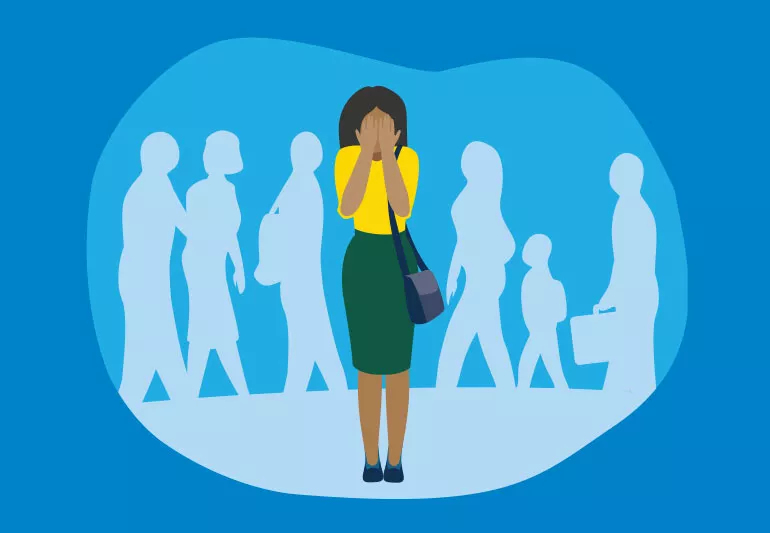Challenging negative thoughts, shifting your focus, and using relaxation techniques can help you manage your social anxiety. Read along to know more details.

If socializing feels harder after years of social distancing, you are not alone. Many people feel more anxious than usual when going out or meeting others. It is completely normal to sometimes feel overwhelmed or out of place in big crowds. But if these feelings don’t go away and start affecting your daily life, it could be more than just nerves. Constant worry, fear of judgment, or avoiding social situations might be signs of social anxiety disorder. If this sounds familiar, know that help is available. You are not alone, and with the right support, socializing can become easier again.
Social anxiety – a term many of us have heard and likely felt at some point. But what does it really mean? Is it just disliking crowds or feeling shy? Or is there more to it? Understanding social anxiety can help us recognize when it is normal nervousness and when it might be something deeper. So, let’s uncover the secrets and see how you can overcome social anxiety on your own.
What is Social Anxiety?
Social anxiety is more than just feeling nervous before a big presentation. It is a deep fear of being judged, embarrassed, or rejected by others. It is that hesitation before speaking up in class, the dread of walking into a social event, or the fear that even the smallest mistake could lead to humiliation. This anxiety is not rare; it is one of the most common mental health struggles. It can sneak into everyday moments, like making small talk, meeting new people, or even eating in front of others. For some, it is so overwhelming that they avoid social situations altogether. Others push through but feel so tense and worried that they cannot focus or enjoy the moment.
If this sounds familiar, know that you are not alone. Social anxiety can feel isolating. But with understanding and support, it is possible to manage these fears and build confidence in social settings.
Symptoms of Social Anxiety –
- Worrying about simple social activities like making calls or meeting new people
- Feeling afraid or embarrassed
- Feeling sick to your stomach
- Withdrawing from others
- Experiencing panic or anxiety attacks
- Blushing or sweating
- Low confidence or self-esteem
- Avoiding eye contact
- Shaking or fast heartbeat
- Struggling with daily tasks when people are watching
- Avoiding social events, group talks, or eating with others
- Fear of being judged or criticized
Difference between Social Anxiety and Social Anxiety Disorder –
Think about that nervous feeling – like butterflies in your stomach before a big speech or a first date. We all have been there. But usually, that feeling fades once the moment passes. Social Anxiety Disorder (SAD) is different. It is like those butterflies have taken over and will not settle down. It is more than just shyness or occasional nerves. People with SAD constantly worry about being judged or embarrassed, and that fear does not go away. It can affect work, school, and relationships, making daily life really challenging.
Feeling socially anxious now and then is normal, but SAD is a real mental health condition that may need treatment. If anxiety is taking over your life, do not hesitate to reach out to a mental health professional. Help is available, and you do not have to face it alone.
7 strategies to combat Social Anxiety –
Social anxiety can make everyday life feel overwhelming. Simple tasks like chatting with coworkers, grocery shopping, eating in public, or going on a date can feel like huge challenges. The idea of overcoming social anxiety might seem impossible, but you are not alone. If you are unsure where to start, here are 7 helpful strategies to begin your journey toward feeling more confident and comfortable in social situations.
- Identify triggers
The first step in managing social anxiety is understanding what sets it off. Everyone has different triggers. For some, big crowds feel overwhelming. For others, speaking in front of a group is terrifying. Even everyday situations like making a phone call or ordering at a restaurant can bring on anxiety. To figure out what triggers your social anxiety, try keeping a journal. Write down when you feel anxious and what’s happening at that moment. Are you in a meeting? Talking to a stranger? Walking into a crowded room? Noticing patterns in your anxiety can help you understand what situations make you uncomfortable.
Once you recognize your triggers, you can start working on ways to manage them. Instead of avoiding these situations, you can take small steps to face them with more confidence. Understanding your anxiety is an important first step toward overcoming it. In the end, remember that progress does not happen overnight, but each step forward brings you closer to feeling more comfortable in social settings. Be patient with yourself and celebrate even the small victories along the way.
- Challenge pessimistic thoughts
If you struggle with social anxiety, you might spend a lot of time worrying about what could go wrong in social situations. Maybe you fear saying the wrong thing, making an awkward mistake, or embarrassing yourself. These thoughts can be overwhelming. Even though, in reality, small social slip-ups happen to everyone and they are usually not a big deal. Most people are not paying as much attention to you as you think.
This is called the spotlight effect – the idea that we believe others notice our mistakes more than they actually do. In reality, people are often too focused on themselves to dwell on minor things they say or do. When anxious thoughts take over, try challenging them with realistic thinking. Instead of assuming the worst, ask yourself – “Would I judge someone else for this?” “Will anyone even remember this tomorrow?” Shifting your mindset takes practice. But over time, it can help ease social anxiety and build confidence in everyday interactions.
- Practice public speaking
Public speaking makes many people nervous, even those who do not struggle with social anxiety. It is natural to feel like everyone is watching and judging you, but in reality, most people are too focused on their own thoughts to analyze every word you say. This fear is often linked to the spotlight effect – the belief that others are paying much more attention to you than they really are.
The good news is that with practice, public speaking can become easier. Start small by practicing in front of a mirror or recording yourself. You can also try speaking in front of a close friend or family member who makes you feel comfortable. If you want to challenge yourself, consider joining a public speaking group where you can gain confidence in a supportive environment. It might feel intimidating at first, but over time, it will get easier. Every small step you take helps build your confidence and makes speaking in front of others less overwhelming.
- Control your breathing
Have you ever noticed how your breathing gets fast and shallow when you are anxious? It is your body’s natural response to stress. But the good news is that you can control it. Deep breathing exercises can help calm your mind and body in moments of anxiety.
Next time you feel overwhelmed, take a few moments to focus on your breath. Close your eyes if it helps. Try the 4-7-8 method. Breathe in slowly for a count of four. Hold your breath for seven seconds. Then exhale gently for a count of eight. It might feel strange at first, but with practice, it gets easier. This simple technique signals your body to relax. Your heart rate slows, your muscles release tension, and your mind feels clearer. Do you know the best part? You can do it anywhere – before a meeting, in a crowded place, or even before bed. Deep breathing will not erase anxiety, but it can help you regain control in the moment.
- Shift the focus
Social anxiety often comes from a fear of being judged. You might feel like everyone is watching and analyzing your every move. This can make social situations feel overwhelming. But the truth is that most people are not focused on you; they are busy thinking about themselves. One way to ease this anxiety is to shift your focus outward. Instead of worrying about how you look or sound, you can pay attention to the people around you. Listen to what they are saying. Ask questions and show true interest in their answers and thoughts. When you focus on their answers, your mind will have less room for anxious thoughts.
This simple shift in mindset can make socializing more natural. Instead of feeling like you are being watched, you become engaged in the moment. Conversations flow more easily and your anxiety starts to fade. It takes practice for sure, but over time, connecting with others will feel less stressful and more enjoyable. You are not alone in this, many people feel the same way and this simple change can make quite a big difference.
- Roleplay scenarios
Practicing conversations with a trusted friend or family member can help with social anxiety. Role-playing everyday situations can make them feel less intimidating and more familiar. When you prepare for different social moments, you will feel more confident handling them in real life. For starters, think about common scenarios that make you nervous. Maybe you need to ask a store employee for help finding an item. Or perhaps you are worried about mispronouncing a name and being corrected. You might fear giving the wrong answer in a work meeting or tripping in front of people. These moments can feel embarrassing, but they happen to everyone.
To make practice more effective, ask your friend to respond in different ways – positive, negative, or neutral. This helps you prepare for the best and worst-case outcomes. Over time, you will begin to realize that even if things do not go perfectly, it is okay. Social mistakes are not as big as they seem at the moment, and with practice, handling them will feel easier.
- Relaxation techniques
When anxiety takes over, your body often tenses up without you even realizing it. Relaxation techniques can help calm both your mind and body. This will make social situations feel less overwhelming. Two powerful methods to try are progressive muscle relaxation and visualization. Progressive muscle relaxation involves tensing and then slowly releasing different muscle groups, one at a time. You should start with your toes, then move up through your legs, shoulders, and arms. This helps release built-up tension and signals your body to relax.
On the other hand, visualization is all about using your imagination to create a peaceful mental escape. Close your eyes and picture a calming scene – a quiet beach, a cozy cabin, or a peaceful forest. Focus on the details, like the sound of waves or the warmth of the sun. These techniques take practice, but over time, they can help ease anxiety and make social interactions feel much more manageable.
3 books about social anxiety –
If you want to explore social anxiety further, these books can be great resources.
1. How to Be Yourself: Quiet Your Inner Critic and Rise Above Social Anxiety by Ellen Hendriksen
In How to Be Yourself, Dr. Hendriksen shares real-life stories and explains the science behind social anxiety. Available on Amazon, the book offers practical strategies to rewire the brain and regain control.
2. Overcoming Social Anxiety and Shyness: A Self-Help Guide Using Cognitive Behavioural Techniques by Gillian Butler
If you want a self-help book that teaches practical CBT techniques to manage social anxiety, Dr. Gillian Butler’s book is a great choice. It is packed with useful strategies that you can work through at your own pace and it is available on Amazon!
3. Find Your Voice: The Secret to Talking With Confidence in Any Situation by Caroline Goyder
Find Your Voice focuses on building confidence in speaking by using techniques to help you relax, stand tall, and speak clearly. Available on Amazon, it is a great read for anyone looking to communicate with confidence in any social setting.
Overcoming social anxiety takes time. But with the right strategies and mindset, it is possible to build confidence and feel more at ease in social situations. Small steps, practice, and self-compassion can make a big difference in your journey to feeling more comfortable and authentic.
















